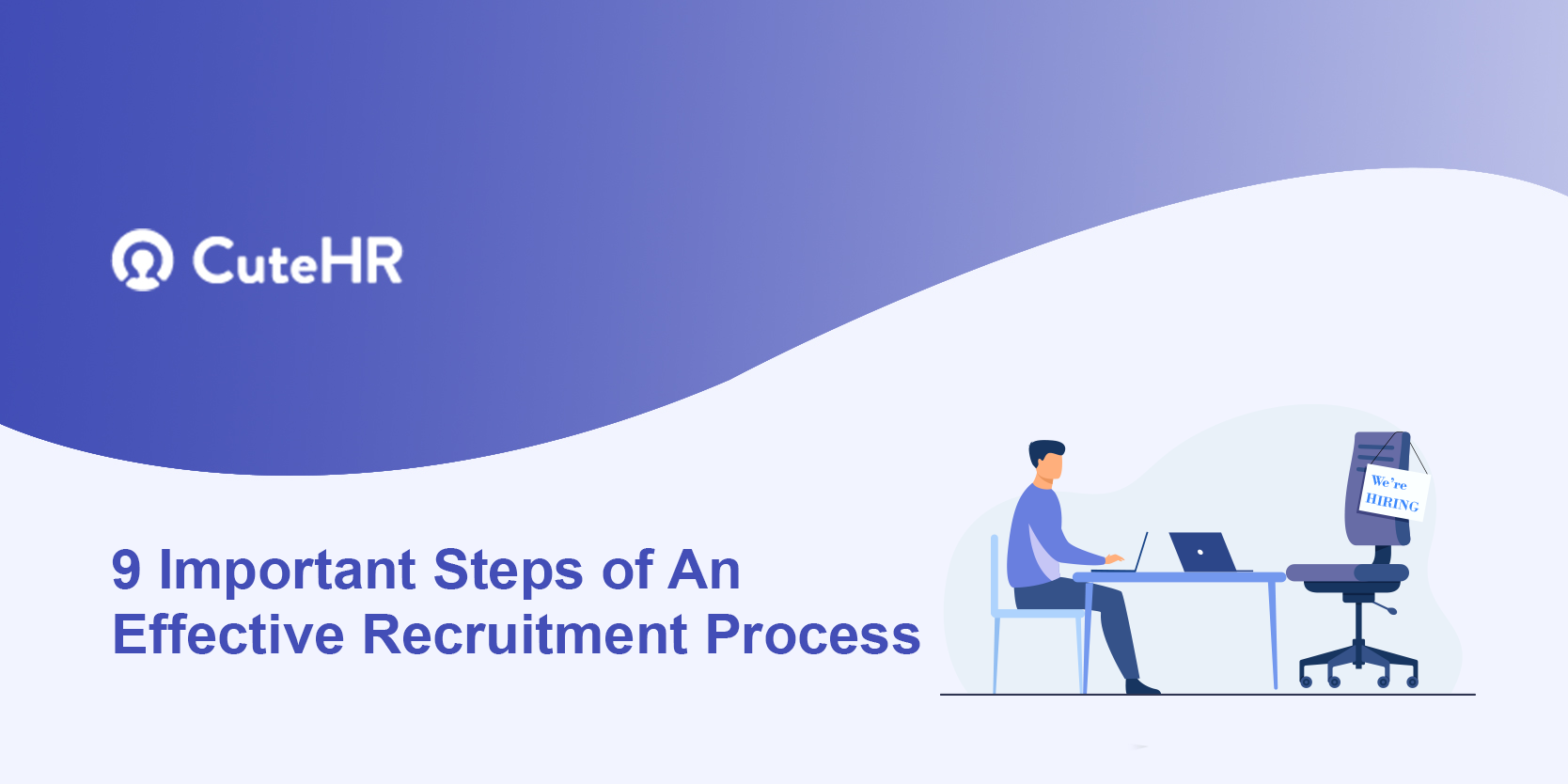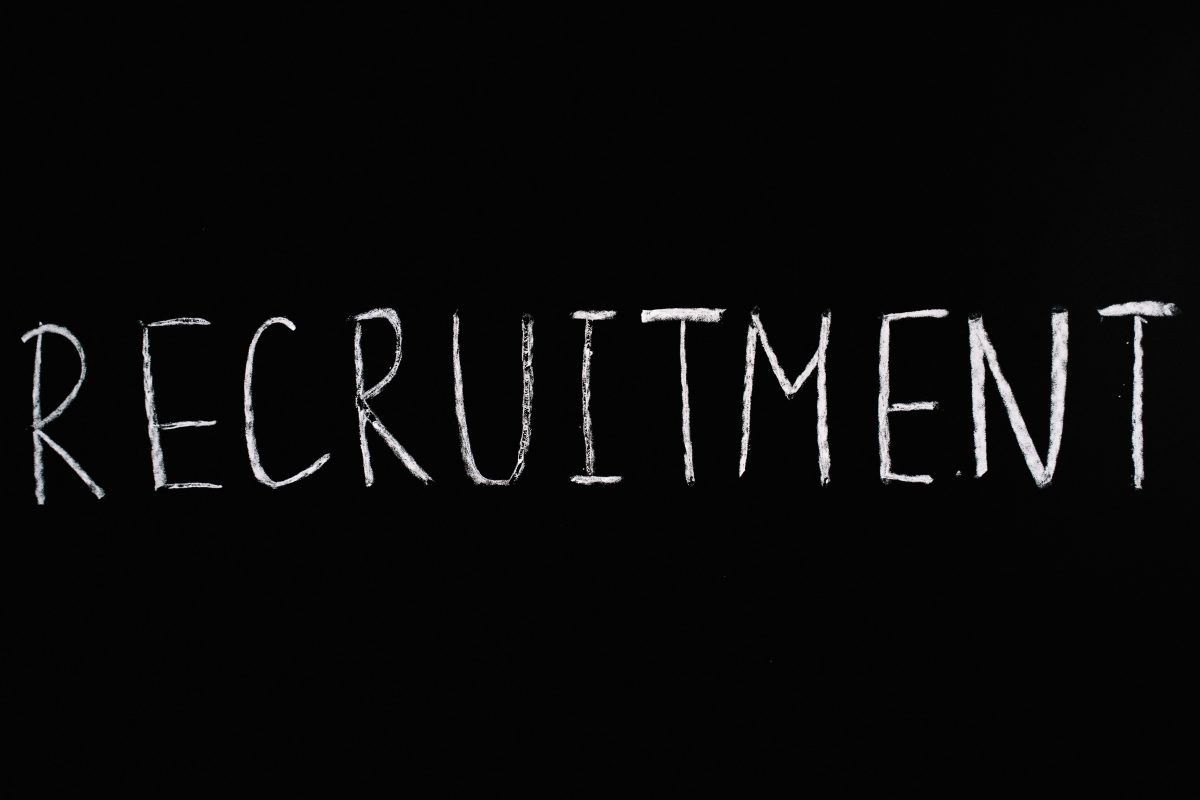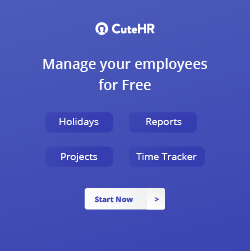05 Aug

Did you know 72% of recruiting leaders worldwide agreed that employer brand has a significant impact on hiring? Let me tell you that the recruiting procedure is as basic as posting a position and then selecting the top applicants from the flood of applications.
The effective recruitment process is one of the most important processes. Let’s see now what is the effective recruitment process, its benefits, the important steps involved in this process, and many more interesting things you’ll get to know in this blog, so buckle up and let’s start.
Table of Contents
What is an Effective Recruitment Process?
An effective recruitment process entails locating a qualified applicant for a vacant position inside a company. It entails soliciting, interviewing, choosing, employing, and onboarding new people to fill a certain function.
The stages of a recruiting process might involve a single individual or a team of persons inside an organization who is in charge of the whole process of properly finding new personnel. There are various steps to the process, which can be completed in-house or by an external agency or third-party organization that specializes in recruiting.
Identifying company needs for staffing, finding and sourcing qualified personnel, interviewing, screening applicants, hiring, and onboarding are all part of the process. Depending on the nature of the firm, the procedure might be very short or take several weeks or months.
Multiple departments may collaborate to create a clear job description before advertising the role, and multiple rounds of interviews with various people within the company may be conducted to find the most suitable candidate – using an HR team or recruitment consultants, particularly in a specific field such as IT or creative industries.
There is no uniform recruitment process since it varies from company to company depending on the structure and size of the firm, the sector, and the function that is being filled. Junior positions may entail a less stringent operation than senior and leadership positions, such as C-suite executives.
Effective Recruitment Process in a Nutshell
An effective recruitment process will help you locate and employ the top applicants for the positions you’re trying to fill. A well-tuned recruiting process not only allows you to meet your hiring targets but also allows you to do so rapidly and at scale.
An effective recruitment process that you establish inside your business or HR department is quite likely to be unique to your organization in some manner, based on its size, the sector you operate in, and any current hiring processes in place.
What will remain similar across most firms, however, are the goals underpinning the development of an efficient recruitment process.
Benefits of an Effective Recruitment Process
An effective recruitment process is a proactive technique for discovering and screening applicants for employment in human resources. The primary advantages of an effective recruiting process are a large candidate pool, precise qualification screens, proactive strategic alignment with corporate goals, decreased attrition, and high morale. Here are some benefits of an effective recruitment process:-
- Improving productivity – This can be accomplished by properly employing new employees who have great potential and are ideal candidates for the position, as well as promoting healthy competition within teams to eliminate complacency.
- Cost-cutting – Using internal recruiting can help you save money on recruitment while also increasing employee engagement.
- More effective search for viable applicants – Having a procedure in place may also do your search for viable candidates more efficient, which can make your organization more desirable to potential recruits in the future. This decreases internal time spent and the expenses connected with recruiting.
- Larger talent pools – Discovering the greatest number of appropriate applicants may lead to higher hiring, which can drive growth and productivity within a firm and may result in a faster turnaround in filling vacancies.
Businesses may save money and time by using a well-defined effective recruitment process. This may be seen in the hiring of the new employee, their output and effect on the team, as well as the business’s expenditure during the process. Targets may be met more quickly if everyone participating in the effective recruiting process steps is clear on the objectives, and swift answers with prospects generate a stronger feeling of professionalism.
Why might businesses need to revise their recruitment process?
The current job market is fiercely competitive. Currently, slightly more than a fifth (27%) of UK employees are looking for a new job. Attracting people to your organization and satisfying their needs, on the other hand, is becoming increasingly difficult — as is encouraging them to stay.
Why? Because the goalposts are constantly shifting. Emerging technology, new selection methods, and evolving expectations are all rewriting the rules for how we should hire, motivate, and treat our people.
To have any chance of success, you must first grasp the six current trends shaping the recruiting market, as well as what they may signify for you.
Connections via social media
Because of technological advancements, both employers and potential recruits are now more available to one another. Because of active networking and social media, information is more easily available – and this impacts both how you recruit and how you should advertise your company.
Data is becoming increasingly important to recruitment agencies and departments in developing more targeted and effective recruitment processes. If you want to attract like-minded people, using social media to show your culture is an important step.
Attractions for candidates
However, attracting like-minded folks involves more than simply the initial contacts. A strong grasp of each party’s vision, beliefs, identity, and objectives is required to develop a successful connection with your candidates. The applicant experience must be appealing from start to finish, especially when potential workers will be getting many offers and comparing each company’s culture and beliefs to their own.
Controlling candidates
The modern candidate wields considerable authority. Because there is a global lack of talent, individuals may more easily choose the type of profession they have – and it tends to be more diversified and transitory than those of previous generations.
Rather than staying with a single organization for many years, today’s workers invest time in establishing a portfolio of experience, resulting in more job moves in a shorter amount of time.
Psychological contracts
It’s a word that refers to anything that isn’t covered by an official employment contract, the unwritten connection between an employer and its workers. Informal agreements, common beliefs, and unstated expectations are examples of this.
But the peace of a workplace is dependent on both you and your employees upholding your half of the bargain. It’s all about managing expectations: employers must communicate to new hires what they may expect from the work, and employees must be transparent about their talents and limitations.
9 Important Steps of an Effective Recruiting Process

1. Searching passively for candidates
You’ve probably heard of the term “elusive talent,” also known as “passive applicants.” The fact is that passive applicants aren’t a distinct group; they’re just potential candidates who possess acceptable talents but haven’t applied for your available positions – at least not yet. So, while you’re seeking passive applicants, you’re actually looking for competent individuals.
Why should you do that when you already have competent people responding to your job postings or submitting their resumes through your careers page?
Here are some ways that hunting for passive prospects might help your recruitment efforts:
- Conduct a specific talent search: Instead of – or in addition to – casting a broad net with a job post, you may target people who meet your specific needs, such as competence in X language or knowledge in Y software.
- Hire for difficult-to-fill positions: There are positions that are in great demand and will bring in a large number of qualified applications from a single ad, and there are many others that are less popular. For the latter, it is beneficial to conduct your own research and attempt to contact persons who would be a suitable fit directly.
- Extend your applicant pool: When you just advertise available positions on select job boards, you are missing out on quality prospects who do not frequent those sites. Instead, by looking at social media, CV databases, or even offline, you can get your job vacancies in front of folks who would not otherwise notice them.
- Diversify your candidate pool: When it comes to building a diverse recruiting process, you frequently need to reach out to applicant groups that don’t often apply for available positions. If you want to achieve gender balance, for example, you may attract more female candidates by posting your job ad to a professional Facebook community dedicated to women.
2. Marketing Recruiters
Use marketing ideas in the hiring process. Find and attract better prospects by raising brand recognition in your sector and efficiently marketing job postings through channels you know will reach potential candidates.
Building informative and interesting careers websites for your firm, as well as writing beautiful job descriptions that strike the mark with prospects in your industry and All of this is part of recruitment marketing, as is encouraging people to follow up with your firm.
3. An overview of the candidate’s experience
The applicant experience is a crucial part of the entire hiring process. It’s one strategy to boost your employer brand and attract the top prospects. Not only do you want these prospects to be aware of your employment offer, examine it, and eventually apply for it, but you also want them to be actively involved. An applicant who is still considering several job options might be affected by the strong sensation that an employer is interacting with them throughout the process and making them feel appreciated as a person rather than a resource being.
4. Effective Candidate Evaluations
Which do you think is more difficult to choose between peas and pizza or cupcakes and ice cream? Unless you’re a peasant, the first problem is easier to address than the second. Let’s extend similar logic to the hiring process: it’s simple to pick one decent candidate over a slew of mediocre prospects, but picking the best from a pool of really talented individuals isn’t. That’s a “positive” problem since it demonstrates your talent attraction strategies (for example, you’ve nailed the recruitment marketing and applicant experience categories above) and increases your chances of hiring the best individual for the position.
5. Referrals
When you ask for references, you’re adding another source to your recruitment mix. Your present employees and external network are likely to know a large number of qualified individuals, and some of them might be your next hiring.
- Retention should be improved: Because they are already familiar with the firm, its culture, and at least one coworker, referred prospects tend to join faster and remain longer.
- Accelerate the hiring process: When your coworkers refer a candidate, they perform the pre-screening for you; they’ll most likely suggest someone who satisfies the role’s basic criteria so you can take them onto the next stage of the hiring procedure.
- Reduce the cost of hiring: Referrals are free; even if you give a referral incentive, the overall amount you’ll pay is substantially less than advertising and hiring external recruiters.
6. Recruiting for Team Collaboration
This effective recruitment process does not rely on just one person; it needs buy-in and, more importantly, engagement from a wide range of stakeholders. For example, these are some of the players:
- Hiring Manager: This is the person for whom the new employee will eventually work. They’re the ones who submit the new employment request (whether due to turnover, a newly created position, or other reasons).
- Recruiter: This is the person in charge of the whole recruitment process and planning. They’re in charge of spreading the word that your organization is recruiting, as well as maintaining the majority of communication with potential employees. They also manage the practicalities, such as screening candidates, scheduling interviews, rejecting or moving ahead with prospects, providing evaluations and job offers, and so on.
- Finance: They will need to be informed of each new request and any new hiring because they are in charge of the company’s finances. These decisions have an influence on the flow of money through the system, and there are a lot of small issues that can affect Finance’s capacity to balance the books.
7. Monitoring of applicants
What would you ask for if you met a hiring genie that gave you three wishes?
- “I wish I didn’t have to locate the right applicant by a certain date.”
- “My recruitment budget would be better if it was unlimited.”
- “If only fairies could handle my HR administrative tasks.”
Unfortunately, there is no such thing as a hiring genie, and you can’t use magic in your recruitment process. As a result, while considering how you’ll fill your available jobs, you need to consider the big picture as well as your restrictions.
8. Onboarding and Customer Service
Shopping for HR products in this crowded market is a major undertaking in and of itself. Complex systems, unpleasant interfaces, and a lack of crucial functionality may wind up increasing your workload rather than assisting you in making better hiring decisions.
When selecting recruiting software to help you enhance your hiring process, look for software that:
Are Easy to Use
While recruiters are the primary consumers of HR technology such as application tracking systems, other employees in the organization may utilize them on occasion. When a new position comes up in their organization, hiring managers, for example, become active in the recruitment process. HR managers will also want a complete picture of all hiring channels as well as access to historical data.
Deliver what they promise
Nothing is more disconcerting than investing money on long-term contracts for a new product only to discover that it lacks the features you anticipated. When this happens, you’ll have to either replace the tool (with the associated expenditures) or purchase extra software to meet your demands.
To prevent this blunder, schedule a demo before making a purchase decision and take advantage of the free trials that certain programs provide. Experiment with the various elements of recruiting systems to have a better understanding of their usefulness and limits. This way, you’ll have a better idea of how they operate and how they can assist with hiring without having to commit to a purchase.
9. Take care of your unique requirements
You may not be able to discover a single magical instrument that can accomplish everything, but you should choose one that meets your highest-priority requirements. So, start by determining what features your future recruitment software must have and then researching what’s available.
If you recruit a lot of people through references, for example, you might choose a system that helps you organize the employee referral process. Alternatively, if your recruiting managers are often on the road, a fully complete mobile recruitment software is likely the ideal answer for your team.
Wrapping it up
This isn’t going to be the case for much longer. It is always changing. However, if you adopt a proactive approach to ensuring that you can find, attract, and retain the ideal people for your company, you will have a significant competitive edge.
There are multiple ways to improve your company’s employment process, from employing diverse methods such as psychometric testing to better evaluate candidate talents to modifying your recruiting strategy to change with the ever-changing employment landscape.
Understanding the importance of an effective recruiting process in saving companies money and time may help them increase productivity, both in terms of hiring and employee engagement.
Recognizing the value of a good recruiting process allows companies to set goals and streamline their staff development plans for better organizational benefit.
Frequently Asked Questions (FAQs)
Why is an effective recruitment process important?
The effective recruitment process is vital for every organization, especially when labor markets are tight – finding the right people for the right roles at the right time. It guarantees that the workforce with the necessary skills and competencies to meet the company’s present and future demands.
What is a strategic, effective recruitment process?
A strategic, effective recruitment process is an approach to winning the best talent based on three components: employer branding, recruitment-directed marketing, and skilled selling. These elements, when combined, produce successful reactions to changing market conditions in support of an organization’s strategic goals.












Himani